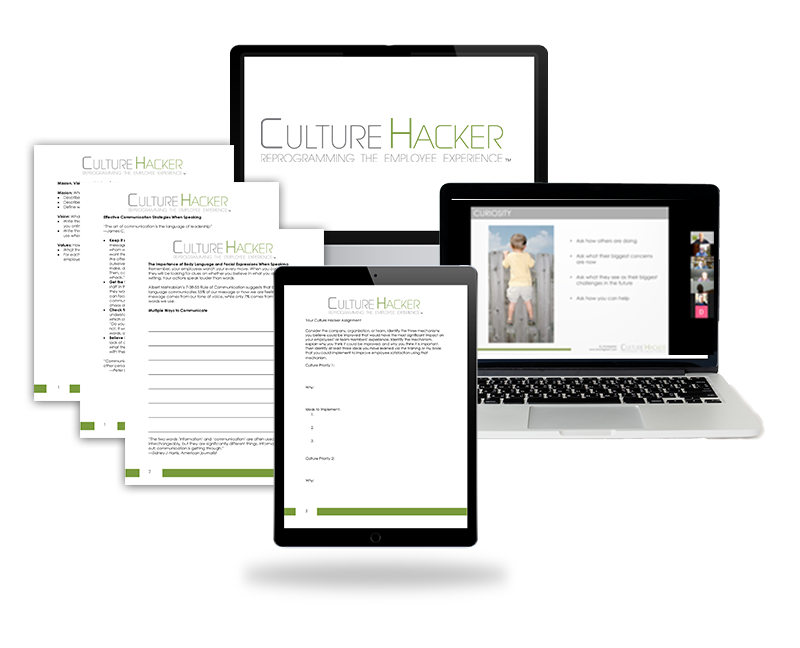The Culture Hacker Small Business Toolbox provides small business owners with limited human resource infrastructure with the necessary tools, training, templates, and advice to develop a positive, performance-driven, and profitable culture.
The Toolbox includes training, tools, and templates around these elements that our research has found to be important for creating a high-performing culture:
- Meaningful Work: Employees want to know that what they do matters, and they can make a difference in their work. It means the company is clear about its purpose, mission, values, and beliefs. It means an employee feels their ideas and insights matter, are encouraged to think creatively and challenge the status quo and are empowered to have some control over their work. They are also proud of the company’s commitment to customer care, its contributions to the community, and its position on social and environmental issues.
- A Focus on Performance: Employees want managers who are good at planning, organizing, staffing, and getting work done. Their manager gets them the training, tools, information, and support to do their job well. They note that their managers can clearly articulate priorities and expectations and manage performance around what needs to be done consistently. Employees want managers who give feedback and have regular performance conversations with them. From these conversations, employees look for managers who recognize and reward performance and effort while holding accountable those who damage team morale or cannot complete the required tasks.
- A Positive Work Environment: Employees want to feel welcomed, included, respected, and valued for what they do. They want to be in a team that helps each other out, regardless of position, and where people get along. Within this type of environment, the company promotes and delivers on a culture of diversity and inclusion by providing managers with skills and tools to reduce biases, prejudices, and any type of harassment.
- Health & Wellbeing: Employees want a company that prioritizes their health and safety. Mental health and well-being are important considerations for employees, and they expect a manager to be conscious of their anxieties and levels of stress. While stress might be unavoidable, employees need managers who provide opportunities to refresh and recharge at work and respect a person’s time outside of work. Employees also want to know they are being paid a competitive wage for their skills and industry, and to have access to benefits that are meaningful to them and their families now.
- Development & Career: Employees want opportunities to grow and develop their strengths and skills. They want to know their career is important to the company and their manager. They also want opportunities to advance their career in addition to completing their daily tasks.
- Transparency & Trust: Employees want to know the organization they work for is honest, ethical, and transparent about their objectives, plans, work practices, and why change occurs. Employees want to be engaged in helping the company achieve its goals and complete its plans.
- Leadership: Leadership is a manager’s ability to inspire their employees’ hearts and minds to want to do what they want them to do, do something they may not want to do, and perform their best. While employees want managers who can get things done, they also want to work for people they admire, want to follow, and inspire them to be their best. They want managers who care about them and treat them with respect. Simply put, employees want managers who are leaders.
- Recruiting the Right Fit & Match: Recruitment incorporates three key mechanisms: attraction, selection, and appointment. Ultimately, if done right, a strong recruitment strategy will: provide more and better candidates; have candidates who are not a good fit self-select out, and have prospective employees already emotionally connected to the organisation before their first day at work.
- The First 90 Days: When a new hire comes on board, many of the things that happen in those first few weeks go a long way in determining if they see their appointment with you as just a job or as something more important and worth investing in. More than half of all people who leave their jobs in a year do so in the first 90 days—often because they do not feel a connection to the brand, business, or people around them.
- Remote Workforce: An owner or manager who creates a good in-person or in-office culture before allowing people to work remotely all or part of the time will maintain a good culture with people working out of the office because they continue to ensure the same level of care, connection, collaboration, celebration, and communication.
- Customer Experience & Care: Culture is a defining aspect of your customer’s experience. It is important to consider all the elements that go into a CX strategy that will give your customers the experience and care they are looking for.
